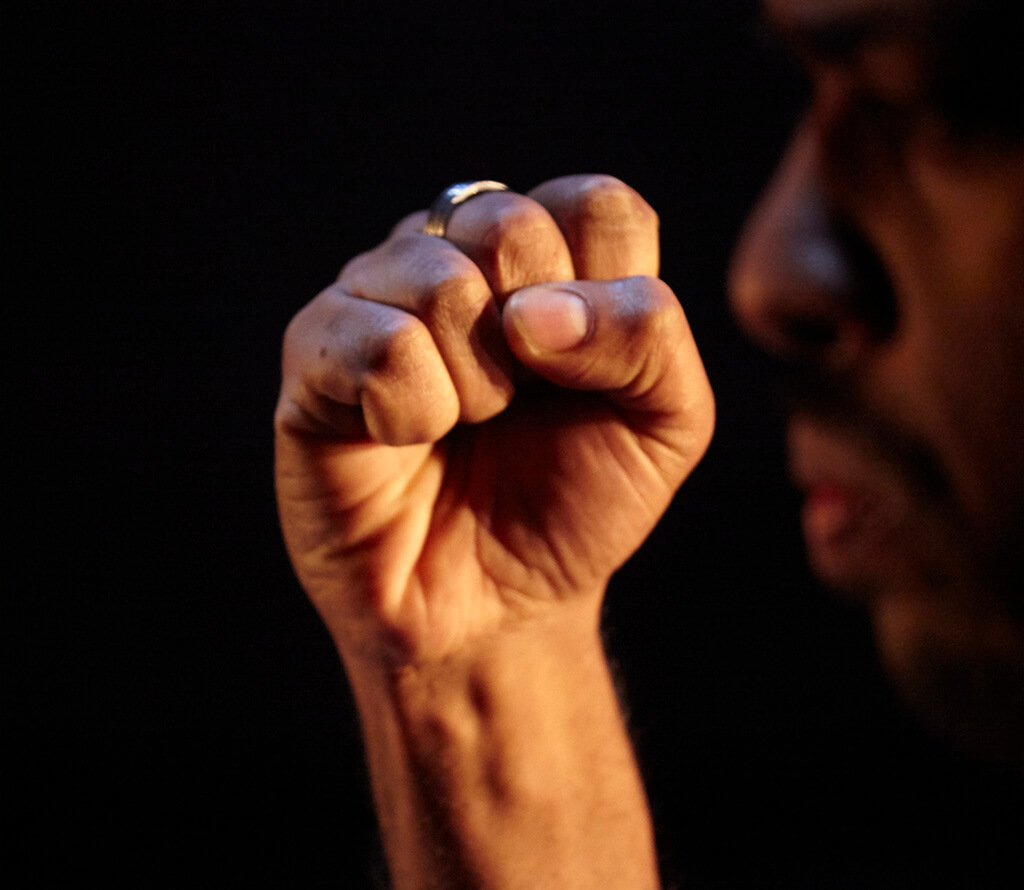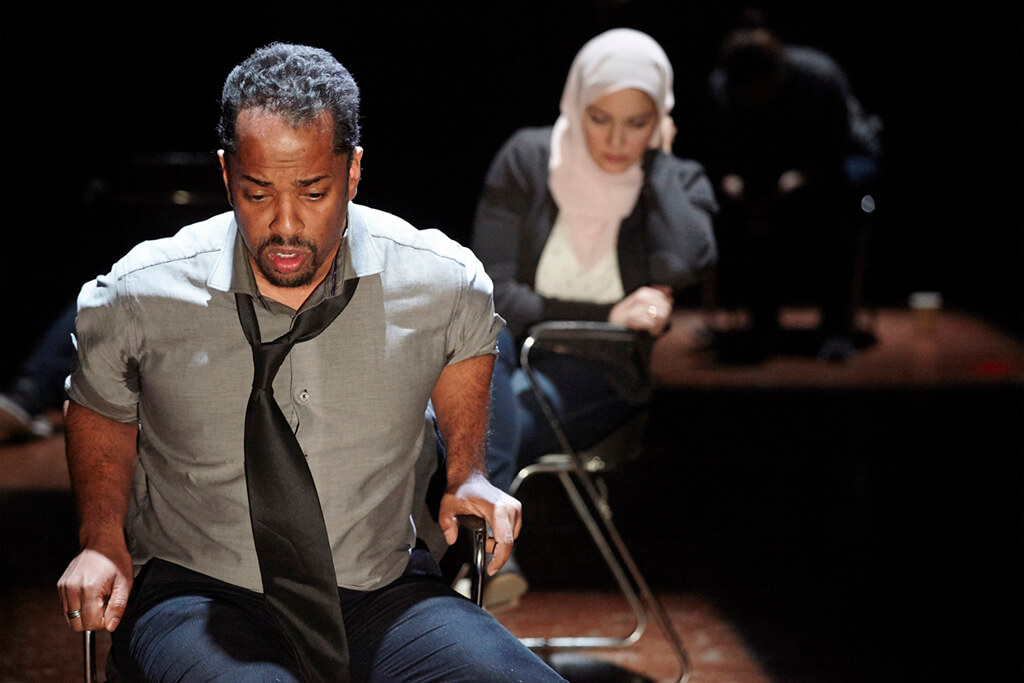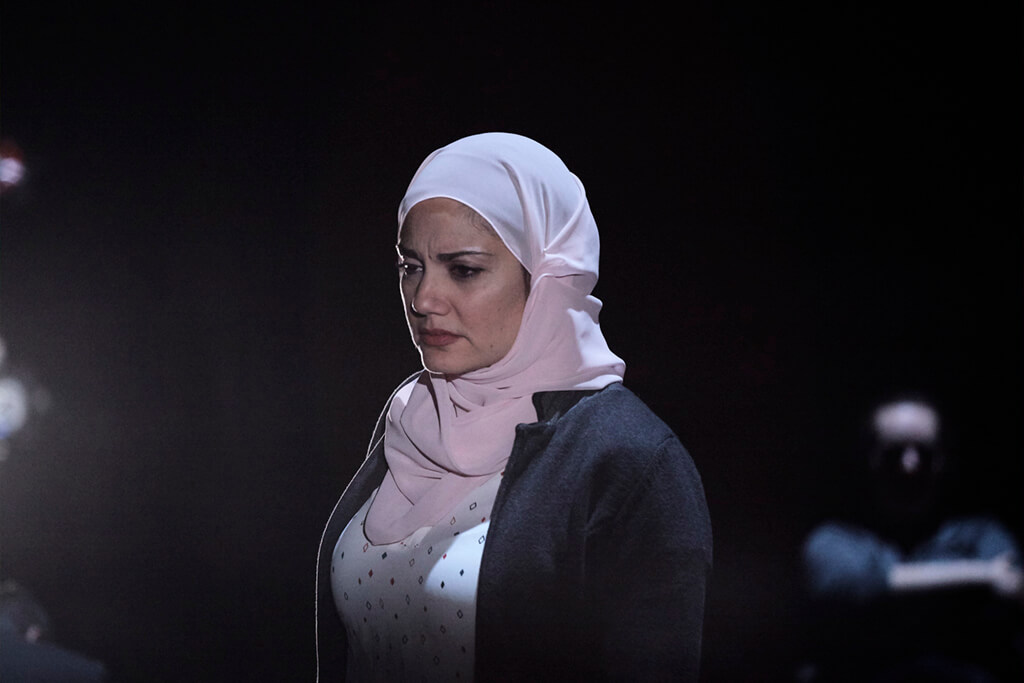
Against the Grain Theatre: Bound at the COC’s Hal Jackman Studio. December 14 to 16, 2017
After seeing the opening performance of Against the Grain Theatre’s Bound, a good friend said to me, “if you’re expecting to hear Handel don’t go to Bound.” Having experienced snippets of the first two weeks of rehearsal from November 27 to December 8, in my preview piece for Bound, I disagreed with this statement. However, after seeing its final performance on December 17, I could not agree more. What remains is an exciting organic work that is growing on the fertile ground of Handel’s music to express contemporary subject matter that is not merely an adaptation, but a creation by all its performers. As Topher Mokrzewski noted after the show, “the more we work on the production, the less like Handel it becomes.” Set in the Canadian Opera Company’s Jackman Studio, Bound tells the stories of seven immigrant and refugee detainees of “The State” using the music of Handel with text readapted by Joel Ivany, and music by Mokrzewski and Kevin Lau.
Detainment by AtG: An Immersive Experience
From the moment you walked in, AtG and its volunteers put their acting chops to the test to create an atmosphere of suspicion and hostility, pushing the boundaries between the stage and the audience. Audience members were hassled, inspected, and some were even pulled aside for questioning. In the studio, the seats surrounded the piano and the seven singers, each sitting under a spotlight as if on Law & Order for interrogation.
“The State,” performed by actress Martha Burns, menacingly recited rules over a loudspeaker. Although the audience was free to chat, one felt obligated to silently listen to Burns’ monotonous recitation, as if we were no longer in the audience, but in detainment with the performers. This creative germ of confinement seeped into everything creating original and provocative materials including the program (reminiscent of a passport), the beautiful marketing materials, and the performers’ headshots illustrated by Dmitry Bondarenko.

The Performers went Beyond Handel’s Music
The performance began with Handel’s “L’allegro” from Il Penseroso ed il Moderato. Sung as a chorus by the soloists, the piece was infused with allusions to the Canadian national anthem in the piano, immediately bringing Handel’s music into the present. One couldn’t help but wonder if this State was closer to home than at first imagined. Rather than singing Handel’s music as Handel might have intended, these characters worked their way out of his music to find their own expression within and beyond it. We see this most clearly at the end of the work, when once again, we hear the “L’allegro” after one of the characters asks, “what is your definition of home?” Unlike the first time, the voices now sing acapella. The national anthem is left behind, as if to say it is the people that make up this country, even if they appear different, they make it home. All seven voices of the soloists combined to perform an extremely powerful contrapuntal finale composed by Lau. It was obvious that this meaning affected several spectators as they reached to wipe the tears from their eyes.
As I covered the concept behind this piece in my preview, I’ll focus the rest of this review on the performance:
Having heard great things about her and yet never given a chance to see her in performance, I was highly anticipating Danika Lorèn’s performance. She did not disappoint. Lorèn gave an impassioned performance throwing her voice into her arias with what one can only describe as precise abandon. Performing a frustrated immigration lawyer fighting for the safety and rights of her clients, Lorèn’s first aria is barely changed from Handel’s original “Il Primo Ardor” from Ariodante. Although the aria is originally about the character being happy because her lover returns her affections, it aptly translates here as an impassioned rage aria with devastating coloratura that Lorèn infuses with beautiful vocal colouring. What is interesting about Lorèn’s voice is that it seems to defy categorization with its flexibility. However, at times what seems like an extensive top register loses the vibrancy and richness offered in her middle voice. I would like to hear her perform a different repertoire than Handel to see how she mitigates this transition between ranges.

This is my second time seeing David Trudgen perform Handel and I am happy to say that he surpassed the high expectations I had for him. At first strange to 21st-century ears, his counter-tenor voice is reinterpreted as that of a woman, Kelly Davidson, who has transitioned to become a man, but is detained because the sex on his passport does not match his birth certificate.
Trudgen gave an impassioned performance. He made me feel like he spilled his guts on the floor by performing Handel with the rawness of contemporary theatre, and yet preserving the purity of Handel’s phrasing. Throughout his precise coloratura, he emphasized the grungy “masculinity” of his lower register and then suddenly flipped to his sweet “feminine,” yet powerful top. We are left shocked at the pain that gender can cause, something most of us take for granted, and awed at the differences and similarities between what we now consider “masculinity” and “femininity” in one voice. In a word, stunning. As if in homage to the power of his performance, Trudgen was the last performer visible on stage.
Despite moments of questionable tuning, mezzo-soprano Victoria Marshall gave a stirring performance with (what I only learned later was) newly improvised ornamentation for different performances. At times her voice was overcome by Mokrzewski’s dissonant and dramatic adaptation of her piano accompaniment which might have been overcome with a clearer enunciation of the text. However, her alluring instrument offers a wide extension to support her daring ornamentation, and a rich lower register to underline her character’s emotional duress.
Baritone Justin Welsh played a newly converted Muslim detained for his faith. Welsh sang powerfully with a voice that some might describe as the very rumbling of the earth. Although his voice is very resonant in lyrical moments, his coloratura lacked colour and suffered from a strident and unfocused sound. In Welsh’s second aria, Lau and Mokrzewski emphasize the final plagal cadence, often heard in church hymns, to expose the similarities between the Christian and Muslim faiths. Also a baritone, Michael Uloth plays a man who learns in detainment that his uncle was a Nazi sympathizer. Uloth conveys his despair through the well-known “Ombra mai fu” from Serse. Although at times his delivery suffered from bodily tension that limited the voice’s resonance, he gave a tender interpretation of this challenging aria.
With only one aria, soprano Miriam Khalil wasted no time to portray her character’s frustration for being confined with the assumption that she is wearing a hijab in protest as opposed to a form of personal expression. Already discussed in my preview, this reinterpretation of “Ah! Mio Cor” from Alcina dissolves the boundaries between the West, characterized by heavily ornamented Handel, and the East, symbolised with melismatic improvisation. Khalil overcame the aria’s high tessitura with her dark soprano voice to deliver an untraditional, but evocative, interpretation. Most memorable was her stillness of at the beginning of the aria as she released a piano to forte crescendo that left the audience wondering which character was singing. Rather than just her own, it seemed as if her voice stood for all the characters’ pain. This was confirmed by her pleading questions, “am I so different? Why control me?”

Tenor Asitha Tennekoon delivered the final aria of the performance, a very slow rendition of “Un Momento di Contento” from Alcina. Because he will be deported, Tennekoon’s character prophesizes that “one day I will return to bring change and see my people through,” motivating each of the six other characters to finally acknowledge one another. All must have been thinking, “when will this future come?” One of the many newcomers to AtG, Tennekoon’s bright tenor voice achieves the inspirational tone needed for this aria that he daringly caps off effortlessly with several high notes. One only wishes that his singing had more focused vowels to clearly convey the English text.
Last but surely not the least, Mokrzewski accompanied attentively at the piano in a very romantic fashion, refreshingly unlike a historically informed performance of Handel. To enhance the musical drama he used pedal and dramatic changes in tempo, not normally heard in this repertoire, to make the music sound more contemporary and distance it from its author.

Did the Audience Forget to Clap?
Although I consider myself a very perceptive spectator, it was not until the end of the show that I realized the audience had yet to clap. What makes this so interesting is that Bound is closer to a concert of arias with spoken text in between than an opera because it has no distinct chronological narrative amung the characters. Why then when there were such impressive performances of these arias and clear stopping and starting between them did no one break out in applause until the end? As noted by my good friend this performance was not Handel where applause after each aria would be encouraged, rather it was a new immersive experience that made the audience feel as if they were one with the drama. What the show lacked in a cohesive narrative was more than made up for by an overarching atmosphere of oppression. It was intense, stressful, and messy. At the beginning of the Bound workshop the creators warned us that this experiment might get politically messy and fail. Based on the two standing ovations, this is the first success of many to come in Bound’s three-year growth. I for one cannot wait to hear how much less like Handel it will become.
#LUDWIGVAN
Want more updates on Toronto-centric classical music news and reviews before anyone else finds out? Follow us on Facebook or Twitter for all the latest.
![]()



